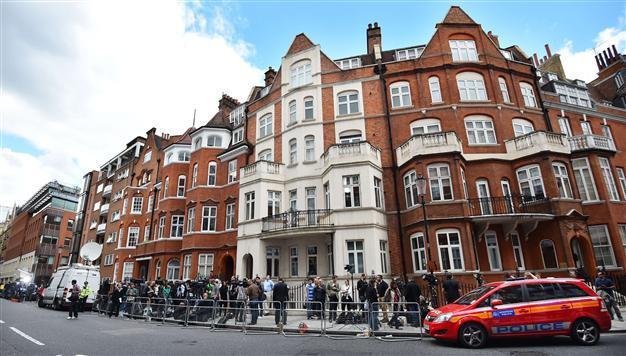Assange will not leave until assured no US extradition: lawyer
SYDNEY - Agence France-Presse

Media gather outside of the Ecuadorian embassy in London, on August 18, 2014 where Wikileaks founder Julian Assange has been claiming asylum for over 2 years. AFP Photo
WikiLeaks founder Julian Assange will not leave the Ecuador embassy in London until it is guaranteed he will avoid extradition to the United States, his lawyer said Tuesday.
The Australian, who has been holed up in the building for two years, indicated on Monday he would leave the compound "soon" amid reports that he was suffering from a heart condition and other ailments.
His lawyer Jennifer Robinson admitted to the Australian Broadcasting Corporation that being cooped up had significantly impacted the 43-year-old's health, but said it was difficult to put a timeline on when he would leave.
"(He will leave) as soon as conditions can be negotiated that allow Julian to leave the embassy while his political asylum, to protect him from the risk of extradition to the US, is respected," she said. "And we haven't seen that happen yet."
Assange sought asylum at the embassy in June 2012 to avoid extradition to Sweden, where he faces allegations of rape and sexual molestation, which he strongly denies.
He fears extradition to Sweden could lead to him being transferred to the United States to face trial over WikiLeaks' publication of classified US military and diplomatic documents.
Robinson said there remained "a complicated number of legal cases that are ongoing both in Sweden, and the ongoing grand jury investigation in the US which is reason for his asylum".
"We'd all like to see him out of there as soon as possible. He's been in there more than two years and the circumstances and the conditions inside the embassy aren't great," she said.
It was not immediately clear when his legal team would be able to negotiate conditions that would make it possible for him to leave, she said.
"We have been asking that there be assurances given that he will not be extradited to the US, that is and has always been his main concern, and indeed is the reason for the grant of asylum that's seen him remain inside the embassy.
"It's very difficult to put a timeline to this," she added.
Britain's Foreign Office has indicated the ministry's position on Assange's case was unchanged and that it remained "as committed as ever to reaching a diplomatic solution".
The Ecuador embassy offers Assange no outdoor space or direct sunlight, making for uncomfortable living conditions, with reports that he is also suffering lung problems as well as heart issues.
Robinson did not details what medical conditions Assange was suffering from but said he had been refused permission to travel to hospital for treatment.
"If he is required to leave the embassy for hospital treatment he would be arrested," she said.
"This is a very serious situation and is the reason that this case has been taken up at the UN by more than 60 human rights groups around the world because of the impact on Julian's health and human rights."
